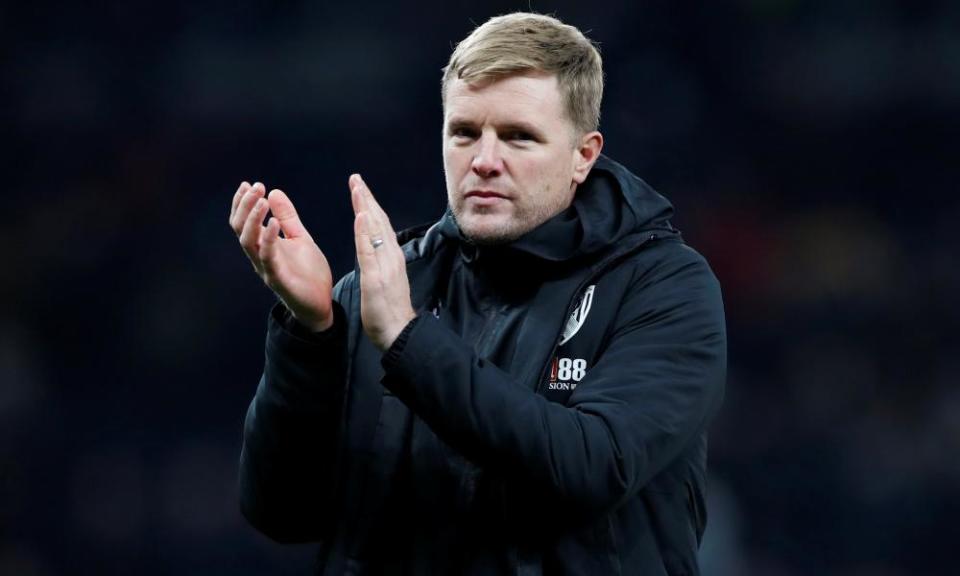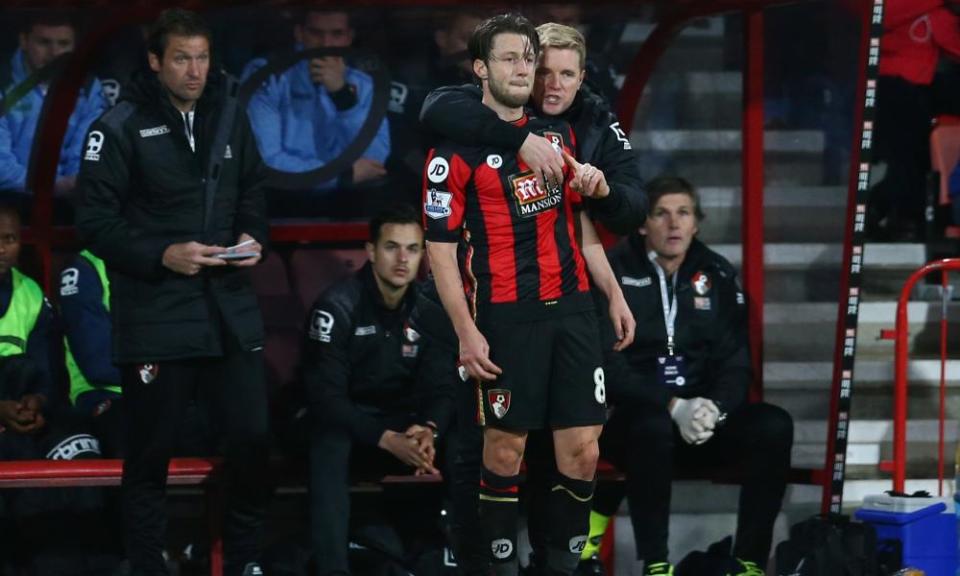Bournemouth split with Eddie Howe, a man who was more than a manager

If relegation hurt, the departure of Eddie Howe brought a numbing sadness to Bournemouth supporters. When the news filtered through, one could forgive those who did a double-take despite knowing how their slide consumed him, the manager almost breaking into tears in an interview after their fate was confirmed amid the loneliness of a deserted Goodison Park.
Howe and Bournemouth will always be synonymous after their journey from the brink of extinction to the Premier League, and what an extraordinary ride it was. Outside the stadium on Sunday morning, a piece of paper that read “Eddie We Love U Please Don’t Leave” was plastered on to signage. More than anything Howe was immensely proud to lead and represent the club he first walked into as a boy, for whom he went on to make more than 250 appearances before stepping into coaching at the age of 29 while still on the books as a player. He first took charge of the club’s under-14s, before being appointed manager in 2009 after a successful spell as caretaker. In those days, he would clip videos of his players on a laptop and a DVD player.
Related: Eddie Howe leaves relegated Bournemouth by mutual consent
From there, the rest is history; survival against all odds despite a 17-point deduction in League Two; leading a team wallowing in League One to the Championship seven months after returning from Burnley; the pitch invasion after all but sealing promotion to the Premier League following victory against Bolton; Callum Wilson smacking the backside of the chairman, Jeff Mostyn, in glee live on television; the open-top bus parade along the seafront. From the top flight they have a mountain of memories to boot, too, dishing out bloody noses to Arsenal, Chelsea, Manchester United and, perhaps most memorably, Liverpool in 2016.
Howe has always maintained it is dangerous to press pause but if he does take time to reflect in the coming weeks – the 42-year-old is expected to enjoy a prolonged period of downtime with his family – he will not be short of stories. “One day I will look back with so many special memories, that will be the time I enjoy it,” he said in November.
Howe’s fingerprints are everywhere you look – he was more than a manager, influential from top to bottom, an omnipresent and hugely respected character à la Arsène Wenger and Alex Ferguson, embedded in the local community. As recently as March he helped to raise vital funds for Julia’s House, the children’s hospice of which he is a patron, by taking part in a two-hour high-intensity interval training session. Before promotion to the Premier League, Howe insisted on doing one-on-one interviews in his tiny manager’s office next to the tunnel until it became impossible owing to media interest going through the roof, and answered questions from students with the same respect as veteran journalists.
Who can forget the images of Howe embracing Harry Arter following the tragic death of his daughter, or Charlie Daniels, whose father died on the eve of victory against Chelsea? He was the cornerstone of the club, involved at every rung, be it signing off training and first-team kits or determining the order of the giant floor-to-ceiling images of players that flank the tunnel. For example, he ensured the sight of Arter, Bournemouth’s tenacious former midfielder and a key pillar of the club’s journey up the leagues, would greet opposition players en route to the away dressing room. As the former Bournemouth captain Tommy Elphick put it: “Every brick that has been laid at the club has been laid by Eddie.”

As for what happens now, the club have already sanctioned the £41m sale of Nathan Aké while Joshua King, who is out of contract next summer, and Callum Wilson, who hopes to represent England at the European Championship next summer, are likely to depart. The former Sheffield United pair David Brooks and Aaron Ramsdale, arguably the club’s player of the season, have admirers but Bournemouth are determined to return to the top flight at the first time of asking.
Wilson signed a new four-year deal last summer worth around £100,000 a week but his contract is thought to contain a 50% wage reduction clause in the event of relegation, and the club are adamant their prized assets will not be cherry-picked. Other sizeable earners such as Artur Boruc and Jordon Ibe have already departed. Their recruitment has not been perfect – Ibe, Brad Smith and Dominic Solanke have struggled to justify big fees – but it is lazy to use it as a stick with which to beat them. Ramsdale, King and Wilson were signed for a combined cost of less than £5m while in Brooks, Lloyd Kelly, Chris Mepham and Lewis Cook, who have been dogged by injuries, they have the bones of a promising Championship side. Not that it is that easy.
Howe’s marriage to the club makes the parting, however amicable, especially challenging, particularly with Bournemouth having to get to grips with falling into the Championship with pre-season only three weeks away. Jason Tindall, Howe’s long-time assistant who first arrived at the club under Jimmy Quinn in 2008, has taken interim charge. The majority of the coaching staff are wedded to Howe, many of them former teammates, including Steve Fletcher and Stephen Purches. The owner, Maxim Demin, the chief executive, Neill Blake, and the technical director, Richard Hughes, will appoint Howe’s successor. Relegation is no disgrace and should not truly tarnish Howe’s reputation – it is safe to say his tenure will never be trumped.

 Yahoo Sport
Yahoo Sport 





































